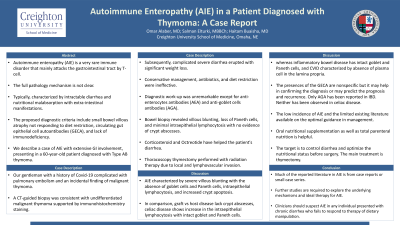Back


Poster Session C - Monday Afternoon
Category: Functional Bowel Disease
C0283 - Autoimmune Enteropathy (AIE) in a Patient Diagnosed with Thymoma: A Case Report
Monday, October 24, 2022
3:00 PM – 5:00 PM ET
Location: Crown Ballroom

Has Audio

Omar A. Alaber, MD
Creighton University
Omaha, NE
Presenting Author(s)
Omar A. Alaber, MD1, Salman Elturki, MBBCh2, Haitam Buaisha, MD2
1Creighton University, Omaha, NE; 2Creighton University School of Medicine, Omaha, NE
Introduction: Autoimmune enteropathy (AIE) is a very rare immune disorder that mainly attacks the gastrointestinal tract by T-cell. The full pathology mechanism is not clear. Typically, characterized by intractable diarrhea and nutritional malabsorption with extra-intestinal manifestations. The proposed diagnostic criteria include small bowel villous atrophy not responding to diet restriction, circulating gut epithelial cell autoantibodies (GECA), and lack of immunodeficiency. We describe a case of AIE with extensive GI involvement, presenting in a 60-year-old patient diagnosed with Type AB thymoma.
Case Description/Methods: Our gentleman with a history of Covid-19 complicated with pulmonary embolism and an incidental finding of malignant thymoma. A CT-guided biopsy was consistent with undifferentiated malignant thymoma supported by immunohistochemistry staining. Subsequently, complicated severe diarrhea erupted with significant weight loss. Conservative management, antibiotics, and diet restriction were ineffective. Diagnostic work-up was unremarkable except for anti-enterocytes antibodies (AEA) and anti-goblet cells antibodies (AGA). Bowel biopsy revealed villous blunting, loss of Paneth cells, and minimal intraepithelial lymphocytosis with no evidence of crypt abscesses. Corticosteroid and Octreotide have helped the patient's diarrhea. Thoracoscopy thymectomy performed with radiation therapy due to local and lymphovascular invasion.
Discussion: AIE characterized by severe villous blunting with the absence of goblet cells and Paneth cells, intraepithelial lymphocytosis, and increased crypt apoptosis. In comparison, graft vs host disease lack crypt abscesses, celiac disease shows increase in the intraepithelial lymphocytosis with intact goblet and Paneth cells, whereas inflammatory bowel disease has intact goblet and Paneth cells, and CVID characterized by absence of plasma cell in the lamina propria. The presences of the GECA are nonspecific but it may help in confirming the diagnosis or may predict the prognosis and recurrence. Only AGA has been reported in IBD. Neither has been observed in celiac disease. The low incidence of AIE and the limited existing literature available on the optimal guidance in management. Oral nutritional supplementation as well as total parenteral nutrition is helpful. The target is to control diarrhea and optimize the nutritional status before surgery. The main treatment is thymectomy.
Disclosures:
Omar A. Alaber, MD1, Salman Elturki, MBBCh2, Haitam Buaisha, MD2. C0283 - Autoimmune Enteropathy (AIE) in a Patient Diagnosed with Thymoma: A Case Report, ACG 2022 Annual Scientific Meeting Abstracts. Charlotte, NC: American College of Gastroenterology.
1Creighton University, Omaha, NE; 2Creighton University School of Medicine, Omaha, NE
Introduction: Autoimmune enteropathy (AIE) is a very rare immune disorder that mainly attacks the gastrointestinal tract by T-cell. The full pathology mechanism is not clear. Typically, characterized by intractable diarrhea and nutritional malabsorption with extra-intestinal manifestations. The proposed diagnostic criteria include small bowel villous atrophy not responding to diet restriction, circulating gut epithelial cell autoantibodies (GECA), and lack of immunodeficiency. We describe a case of AIE with extensive GI involvement, presenting in a 60-year-old patient diagnosed with Type AB thymoma.
Case Description/Methods: Our gentleman with a history of Covid-19 complicated with pulmonary embolism and an incidental finding of malignant thymoma. A CT-guided biopsy was consistent with undifferentiated malignant thymoma supported by immunohistochemistry staining. Subsequently, complicated severe diarrhea erupted with significant weight loss. Conservative management, antibiotics, and diet restriction were ineffective. Diagnostic work-up was unremarkable except for anti-enterocytes antibodies (AEA) and anti-goblet cells antibodies (AGA). Bowel biopsy revealed villous blunting, loss of Paneth cells, and minimal intraepithelial lymphocytosis with no evidence of crypt abscesses. Corticosteroid and Octreotide have helped the patient's diarrhea. Thoracoscopy thymectomy performed with radiation therapy due to local and lymphovascular invasion.
Discussion: AIE characterized by severe villous blunting with the absence of goblet cells and Paneth cells, intraepithelial lymphocytosis, and increased crypt apoptosis. In comparison, graft vs host disease lack crypt abscesses, celiac disease shows increase in the intraepithelial lymphocytosis with intact goblet and Paneth cells, whereas inflammatory bowel disease has intact goblet and Paneth cells, and CVID characterized by absence of plasma cell in the lamina propria. The presences of the GECA are nonspecific but it may help in confirming the diagnosis or may predict the prognosis and recurrence. Only AGA has been reported in IBD. Neither has been observed in celiac disease. The low incidence of AIE and the limited existing literature available on the optimal guidance in management. Oral nutritional supplementation as well as total parenteral nutrition is helpful. The target is to control diarrhea and optimize the nutritional status before surgery. The main treatment is thymectomy.
Disclosures:
Omar Alaber indicated no relevant financial relationships.
Salman Elturki indicated no relevant financial relationships.
Haitam Buaisha indicated no relevant financial relationships.
Omar A. Alaber, MD1, Salman Elturki, MBBCh2, Haitam Buaisha, MD2. C0283 - Autoimmune Enteropathy (AIE) in a Patient Diagnosed with Thymoma: A Case Report, ACG 2022 Annual Scientific Meeting Abstracts. Charlotte, NC: American College of Gastroenterology.
